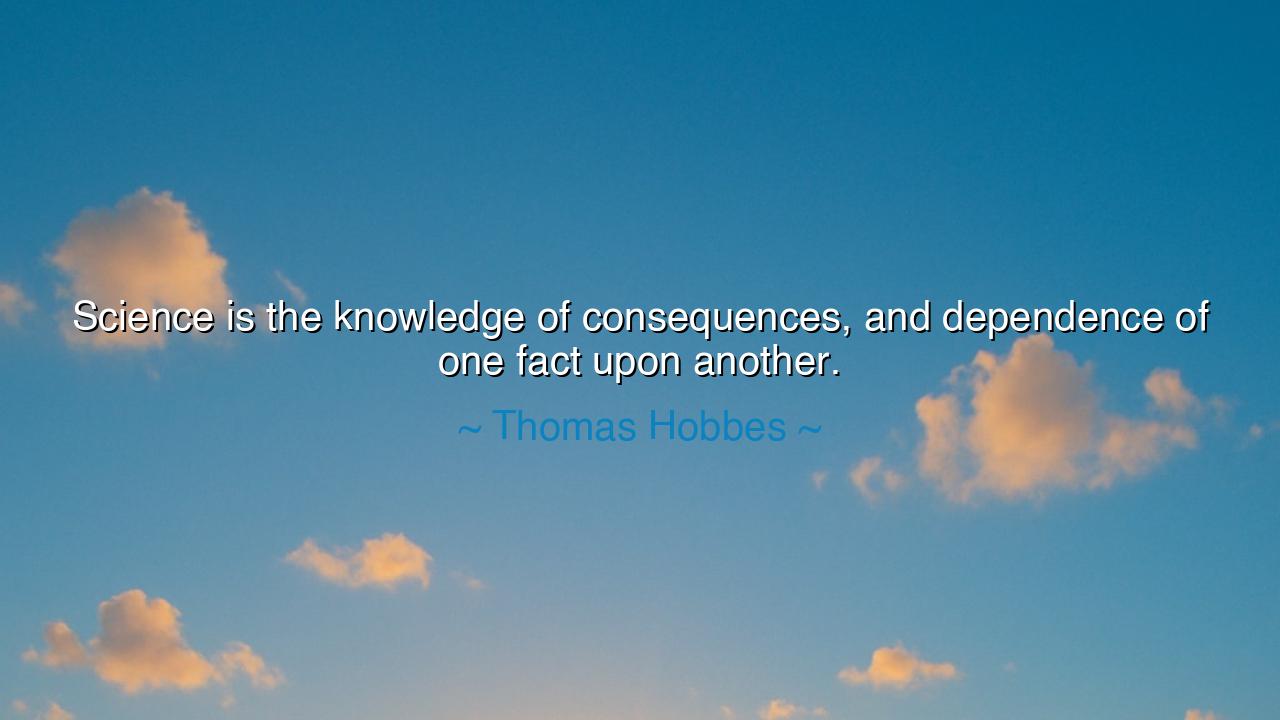
Science is the knowledge of consequences, and dependence of one






Thomas Hobbes, the great philosopher of the seventeenth century, spoke with clarity when he declared: “Science is the knowledge of consequences, and dependence of one fact upon another.” In this saying lies a truth both profound and eternal. Science is not mere collection of scattered observations, nor the memorizing of facts like stones in a heap. It is the weaving of a tapestry, where each thread is bound to another, where cause and effect dance in harmony, and where understanding is born not from fragments but from the whole.
To Hobbes, living in an age of upheaval, when nations trembled and old orders crumbled, the quest for certainty was paramount. He sought in science a foundation for truth—a knowledge not shaken by rumor, opinion, or superstition. For him, the strength of science was in its recognition of consequences, the unbreakable chain of logic that binds one thing to another, so that by knowing the beginning, we may predict the end, and by seeing the cause, we may foretell the effect.
Think of the seafarers of old, who once feared the vast oceans as realms of chaos. But when they began to trace the dependence of one fact upon another—the pull of the moon upon the tides, the steady rising of certain stars—they no longer wandered in blindness. They steered their ships with confidence across the unknown seas. The consequence of knowledge was freedom, and the dependence of fact upon fact was the compass that guided their way.
Consider also the life of Galileo Galilei, who turned his gaze to the heavens. He did not merely marvel at the stars as jewels scattered in darkness. He saw in their motions a system, a dependence of one body upon another, the consequences of gravity and motion unfolding before his eyes. For this, he was opposed by the powers of his day, yet his vision could not be silenced. In his work, we see Hobbes’ words made flesh: science as the knowledge of how one truth begets another, until the whole universe speaks with order.
And yet, let us not be deceived: this chain of knowledge is not cold, nor lifeless. It is a fire that illuminates the mind, a power that can lift humanity from fear into mastery. To see the links between facts is to understand the fabric of reality itself. Without such sight, man is tossed like a leaf in the wind; with it, he becomes the sailor, steering his vessel upon the seas of destiny.
The lesson for us, O listeners, is plain. If you would walk the path of wisdom, seek not only to know, but to know why and how. Do not be content to gather facts as a miser gathers coins. Seek the golden thread that ties them together, the hidden consequence that flows from cause to effect. For it is in understanding the connections that knowledge becomes power, and learning becomes wisdom.
Practical steps are these: when you study, always ask what follows from what you have learned. When you face a choice, look to the chain of consequences that will spring from your decision. When you encounter a truth, ask how it rests upon another truth, and what truths may be built upon it. In this way, your mind will grow not as a pile of stones, but as a temple, each block resting firmly upon the next, rising toward the heavens.
Thus, let Hobbes’ words echo through your heart: “Science is the knowledge of consequences, and dependence of one fact upon another.” Learn this, and you shall not drift aimlessly in the storm, but will walk as one who understands the patterns of the world, wielding knowledge not as a burden but as a light. For the wise see not only the fact before them, but the truth that springs from it—and in that vision lies the power to shape destiny.






AAdministratorAdministrator
Welcome, honored guests. Please leave a comment, we will respond soon